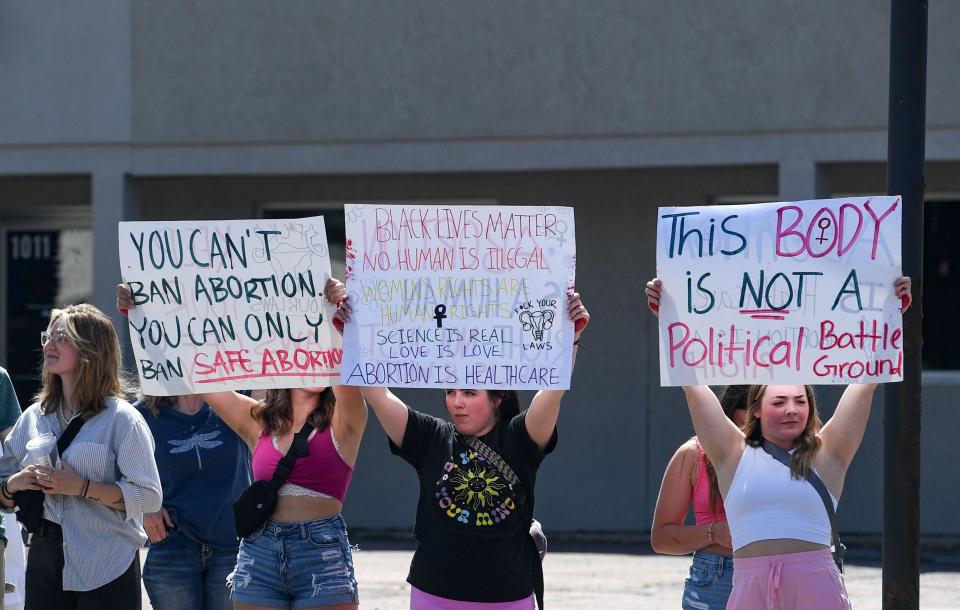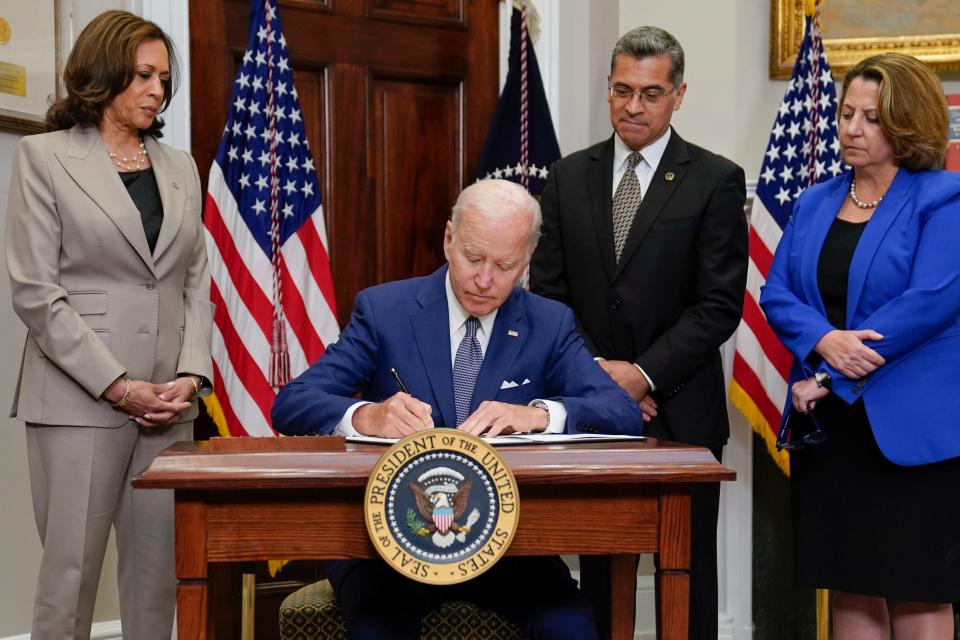What does Joe Biden's order protecting abortion mean for pregnant South Dakotans?
- Oops!Something went wrong.Please try again later.
President Joe Biden issued an executive order July 8 that aims to protect access to abortion and emergency care for pregnant women.
Biden’s actions come after the U.S. Supreme Court overturned the decades-old ruling of Roe v. Wade in June, which guaranteed a pregnant patient's right to terminate their own pregnancy.
Now, the conflicting directives from the federal government and states like South Dakota, which immediately banned abortions after the ruling under a 2005 trigger law with the exception of when the mother's life is at risk, is confusing patients and physicians.
“The impact of these abortion bans has been to instill fear and real chilling effect,” said Elise Wells, the co-founder of Plan C, an online guide for people seeking information about abortions. “Everybody's afraid right now of what they can and can't do. We really need to look at what the laws say, and the laws are really restricting the provision of care, not self managed abortion or the receipt of care. That's an important thing to understand as we talk about, 'Well, what are some of the options that people still have in South Dakota for access?'”
More: Had there been an abortion special session, SD Democrats wanted exception for rape, incest
So what do the president’s priorities mean for South Dakotans, as we wade into territory previously unexplored?
The Argus Leader breaks parts of the executive order down one by one.
Access to medical abortion
Before Roe was overturned, Gov. Kristi Noem signed an executive order to ban telemedicine abortion care. The order, later passed into law in March, was challenged by the ACLU in court. The case was dismissed after SCOTUS made its decision.
Part of the governor’s ban meant doctors could not prescribe the FDA-approved pills needed for a medicated abortion through a telehealth appointment. Instead, a pregnant patient had to go to a clinic in-person multiple times to receive the two pills, Mifepristone and Misoprostol.

While the president’s executive order is meant to “ensure that medicated abortion is as widely accessible as possible,” it’s unclear how that’s supposed to be enforced and if the pills are protected across the county, Wells said.
But in states where there’s a near total abortion ban and people can get pills sent to them through mail-forwarding services to self-manage their abortion, the legality is unclear.
“They're approved by the FDA, but the problem is that the states regulate the provision of the pills, the provision of the care by the medical community,” she said. “I don’t know how any federal order is going to get around that.”
Those two pills, commonly used in a medicated abortion, have been approved since 2000 and were used in about 54% of medical abortions in 2020, according to the Guttmacher Institute, which tracks abortion statistics.
More: Will Sioux Falls doctors be charged for performing abortions? Here's what we know.
The pills can be used to end a pregnancy up to 10 weeks after the date of an individual’s last period, according to the FDA.
Noem has been outspoken about the concern of abortion pills, stating in a nationally televised interview in June, "these are very dangerous medical procedures. We don’t believe it should be available, because it is a dangerous situation for those individuals without being medically supervised by a physician.”
But Wells said the pills have a well-documented history of being safe and effective in the 20 years that they've been approved. The American College of Obstetricians and Gynecologists also have found the medicated abortion "improves care and the personal experience for women who find that it is the right choice for them."
Emergency Medical Care
Following Biden’s executive order, the U.S. Department of Health and Human Services also released guidance July 11, stating pregnant patients have full rights to access emergency medical care, including emergency abortions to save the life of a pregnant mother, in states like South Dakota.
“In no uncertain terms, we are reinforcing that we expect providers to continue offering these services, and that federal law preempts state abortion bans when needed for emergency care,” HHS secretary Xavier Becerra said.

In a statement to the Argus Leader, Avera Health stated it treats life-threatening complications to save the life of the mother even if it does terminate the fetus.
However, Sanford Heath in its statement, would not clearly state how the healthcare system would treat a pregnant patient if their life was at stake. But Sanford is prepared to treat mothers on a case-by-case basis.
"Our primary objective is to ensure our patients have access to the care they need, and our providers retain the ability to practice evidence-based medicine in accordance with the law," Sanford's statement read.
Sanford Health added the focus is to make sure patients and families have guidance to make the best clinical decision for themselves.
In South Dakota, the only exception under state law for an abortion is if the life of the woman is at stake. A woman in state law is defined as "a female human being whether or not she has reached the age of majority."
Access to contraception
The Biden administration also asked HHS to put steps in place to expand access to contraception, including birth control, emergency contraception like Plan B and intrauterine devices (IUDs).
Kristin Hayward, the advocacy manager of Sioux Falls Planned Parenthood, said during a rally on July 10 in front of the Minnehaha County courthouse that Planned Parenthood is still providing access to contraception in South Dakota, though the facility stopped offering abortion services a week before the high court's ruling.
The Sioux Falls Planned Parenthood has seen a small increase in patients requesting birth control since the ruling, Sheena Dooley, the communications manager of Planned Parenthood North Central States, wrote in an email.
Education efforts
The executive order also asked HHS to create an education and public awareness campaign, “regarding access to reproductive health care services—including abortion—to ensure that Americans have access to reliable and accurate information about their rights and access to care.”

Noem has already created life.sd.gov, a website dedicated to helping pregnant mothers examine the choices they can make in South Dakota short of accessing abortion.
And South Dakota's Family Planning program, which provides education services and health screening for people who might want a child in the future, is completely supported by federal funds, according to the Department of Health.
Planned Parenthood also continues to provide education services, including one-on-one education, culturally-specific programs and peer education, Dooley said.
She added it's unclear though if Planned Parenthood will receive additional federal funding through Biden's executive order. Currently, they receive some state and federal funding for their education work surrounding family planning and contraception.
More: Will Sioux Falls doctors be charged for performing abortions? Here's what we know.
Where do we go from here?
In a joint statement, Noem and other anti-abortion legislatures decided against a special session for abortion laws July 15. South Dakota Democrats decried the decision, releasing seven bills they would have included, like creating an exemption for abortion when the pregnancy was a result of rape or incest, as well as expanding Medicaid to mothers 180 days after the birth of a child.
Now, pregnant women, their families and their providers will likely have to wait until at least January, when the state legislature convenes for session to start drafting new laws.
Follow Annie Todd on Twitter @AnnieTodd96. Reach out to her with tips, questions and other community news at atodd@argusleader.com or give her a call at 605-215-3757.
This article originally appeared on Sioux Falls Argus Leader: How Joe Biden's protection of abortion access impacts South Dakota

